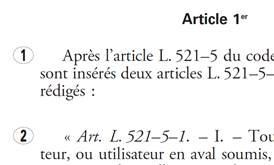Dear all,
I’m Olivier, developer at la DILA, a French organism responsible for publishing legislative texts and official data.
We are looking at Akoma Ntoso Schema Implementation to replace the Word authoring system of the French National Assembly (inputs are currently transmitted in word format, then converted to some complex xml).
If you don’t mind me to, I’m calling on you for some questions about the core vocabulary specification :
- 4.7 Custom Elements
We have to keep our XML valid against the global standard, but do you recommend restraining the schema for easier authoring and to fit only our needs ?
- 6.3 Hierarchical Structure :
Is there a hierarchical order to respect among the hcontainer elements listed in the table page 70 ? (eg: a section must be included in a chapter)
Or can we choose and create our own structure of hcontainer ? (for local understanding purpose)
I have some more questions not approached in this specification thus outside the scope of this email list :
- Structure approach: an hcontainer for each paragraph ?
Most of the exemples I have seen take advantage of using an hcontainer for every paragraph. I haven’t seen any recommendation about that in the vocabulary specification:
So I’d like to have your opinion between the two structures below, which would be the recommend one to you ?
Structure 1 : an article containing several hcontainer for each paragraph:
<article>
<num>Article 1<sup>er</sup></num>
<paragraph>
<num>1</num>
<content>
<p>La division 2 du chapitre III du titre Ier du livre Ier de la deuxième partie du code général des collectivités territoriales est ainsi modifiée :</p>
</content>
</paragraph>
<paragraph>
<num>2</num>
<content>
<p>1° L’article L. 2113–10 est ainsi modifié :</p>
</content>
</paragraph>
</article>
Structure 2 : an article with an unique content:
<article>
<num>Article 1<sup>er</sup></num>
<content>
<p>La division 2 du chapitre III du titre Ier du livre Ier de la deuxième partie du code général des collectivités territoriales est ainsi modifiée :</p>
<p>1° L’article L. 2113–10 est ainsi modifié :</p>
</content>
</article>
- PDF numbering for easier navigation
A specific need for our PDF concerns a numbering for easing the viewing of an article content:

Sometimes the numbering isn’t linear, it is provided by a tool, so we have to store and reuse the information for PDF output. I haven’t seen a tag or attribute addresses this need in the specification. To your opinion
how could we implement it ?
- Misunderstanding of the use of custom attribute @id
My last question is curiosity about the use of custom @id I have seen in lots of exemples, especially those from the European parliament :
Exemple : <division
id="_2012744_0015">
Why do they use custom @id instead of the attribute @eId provided ? It is because their identification method doesn’t match the one preconized for @eId attribute ?
In advance thank you for taking the time to answer me.
Some of the questions aren’t relative to the understanding of the core vocabulary document, but it would be glad of you if you can provide me with an answer. This implementation is an entry point for introducing the AKN
standard in the French legal data ecosystem.
Regards,
Olivier Carizzoni